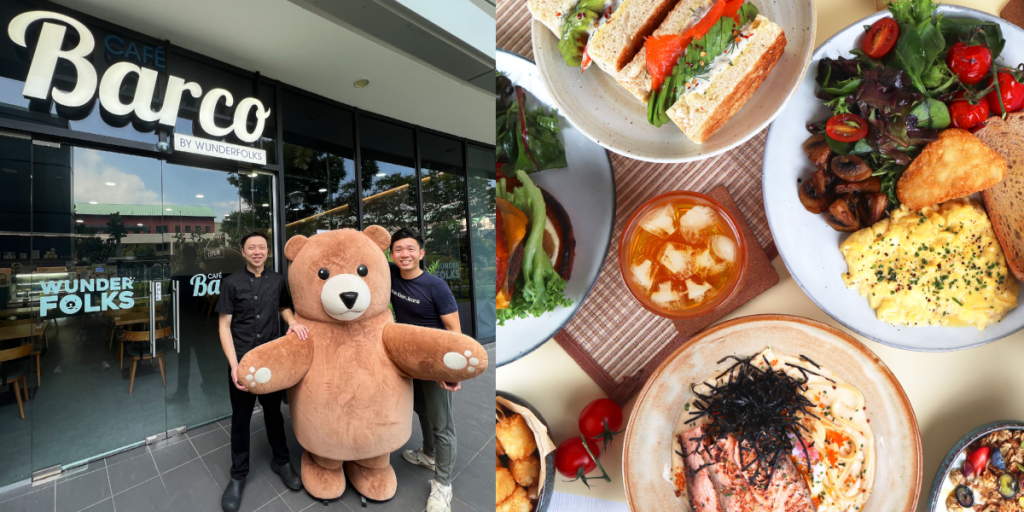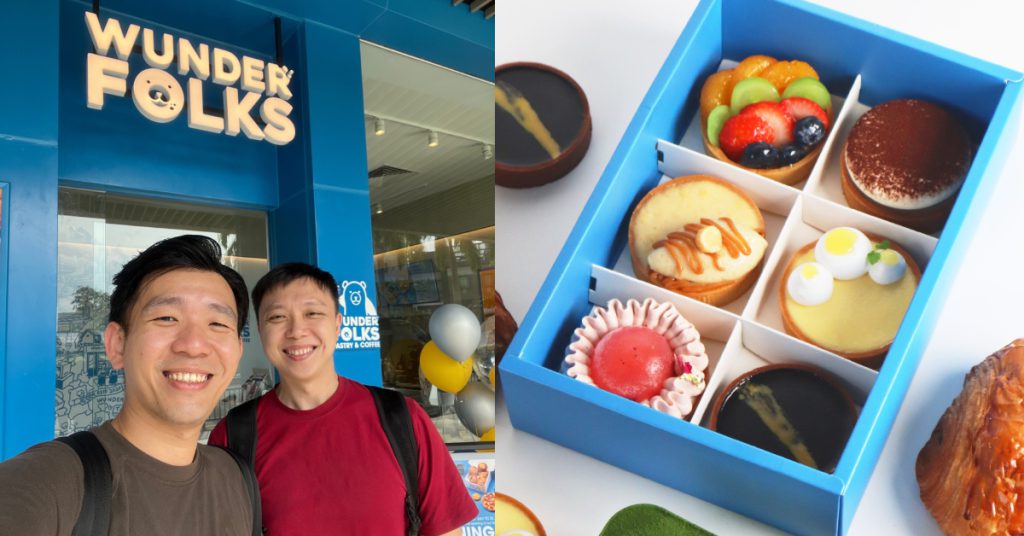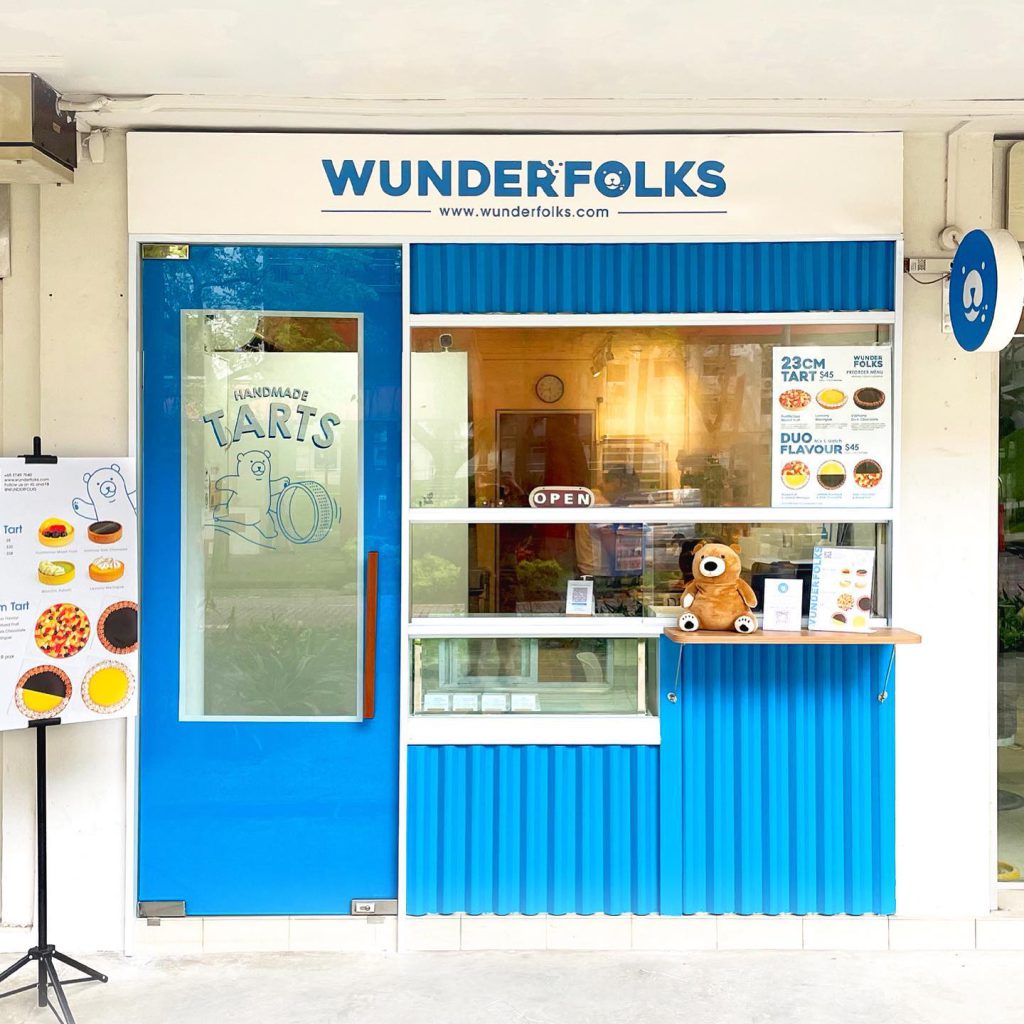I’ll be honest—I don’t have a big sweet tooth.
When it comes to sweet treats, I prefer cream and custard puffs, fruit tarts, and cakes. But even desserts like lemon meringue tarts leave me craving the extra zesty lemon taste.
That is, until my younger sister got me to try an array of fruit tarts from Wunderfolks that satisfied my cravings and piqued my curiosity about the brand.
After some digging, it turns out Wunderfolks is a home-based bakery that has grown to open physical shops islandwide. But with some businesses unable to scale beyond the home kitchen, how did they do it?
The founders first met at the Singapore Navy
The first ingredient, it seems, is having a partner who complements your skillset. Before launching Wunderfolks, Vincent Tay pursued a Diploma in Pastry and Bakery from At-Sunrice GlobalChef Academy in Singapore.
While he eventually became a financial advisor, he kept his interest in baking alive by selling sweet treats to family and friends on the side.
When he needed a designer for branding and photography for his home-based bakery, his friends from the Singapore Navy connected him with Dale Thia, who had a background in design and advertising.

Together, they launched Wunderfolks in 2020 and quickly gained popularity online. According to Dale, they only invested S$360 to cover basic ingredients and packaging, and the rest of the funds had been self-generated through the company’s operations.
“Our guiding principle is to only spend the money we have on hand, an approach that has served us well so far without needing any outside investors,” he added.
Growing the business
For Wunderfolks, a unique recipe is the second and undeniably most crucial ingredient. In addition to putting their spin on classics, they meticulously test and refine new flavours before they hit the shelves.
Vincent shared that new flavours often arise from suggestions made by friends and customers, and when a flavour doesn’t cut it, the idea goes back to the drawing board for further improvement.
Considering that French pastries often come with higher price tags, Dale and Vincent also chose to sell their tarts at more “affordable” prices to make them more accessible to the mass market.
But wouldn’t it hurt the business in the long run? Vincent explained that balancing cost and selling price is essential, and product costs should always be monitored to prevent unnecessary price increases.
With the business gaining more traction, the number of orders eventually grew beyond the capacity of their home kitchen. That’s when they decided to take a leap of faith and opened their first physical shop at an HDB at Sterling Road in 2021.
Dale shared that they had a “very reasonable” landlady who provided a rental rate, making it easier to start. They were simultaneously looking for a workspace to fulfil a potential order that, if confirmed, could have covered about six months’ rent.
Even if the order fell through (which it unfortunately did), the founders decided to secure the unit after carefully calculating their finances and projecting the potential sales they could generate. “The numbers looked promising,” they recalled.
Dale also pointed out that Wunderfolks’ low startup cost allowed them to break even as they pivoted from a home-based business to a brick-and-mortar business, and the set-up cost was fully funded by the profit earned as a home-based business.
As they slowly found their groove, with the help of their peers who had started F&B businesses during the same period, Dale and Vincent saw an opportunity to expand their reach as operations scaled up.
This led them to close their first shop six months after opening and shift to a bigger kitchen at Joo Chiat. However, due to inadequate space and electrical supply as they grew, they relocated twice before establishing their central kitchen, office and cafe at Kaki Bukit this year.
Diversifying their revenue streams
Wunderfolks’ third and final ingredient for business longevity is diversifying revenue streams. Currently, Wunderfolks has three physical outlets, including a cafe: Cafe Barco.

Opening a cafe has always been on Dale and Vincent’s minds, but they did not focus on it until they came across their current unit. Dale explained that Nasty Cookie previously occupied the space, which was bigger than expected.
Cafe Barco was opened to become the “go-to spot” for office workers in the area during the weekdays and a weekend destination for families. In addition to its dessert offerings, the cafe offers a series of Japanese-fusion dishes and pastries from Flourcrafts Bakery.
“Rather than a straightforward dessert cafe, we wanted to push our team to grow beyond their comfort zone. We chose a Japanese-fusion cuisine, as it is a style that appeals to Singaporeans of all ages—one that we personally enjoy as well,” Dale added.
Wunderfolks also leverages corporate clients, partnerships, and supplies to other cafes and third-party retail platforms, while its online and retail sales remain its primary sources of revenue.
Aside from managing their different revenue streams, the business is learning to grapple with hiring challenges. Dale acknowledged that staffing has long been a significant obstacle in the industry due to the limited talent pool.
He added that the company used to hire only experienced staff, which proved insufficient to maintain a consistent workforce during the peak seasons. They have since pivoted to training interested candidates in-house, including those without experience in F&B, an effort which has shown positive results so far.
Looking forward, Dale and Vincent aim to cement Wunderfolks as a trusted household brand in Singapore that produces quality treats at price points that cater to their customers.
Rather than relying on going viral or hype, we aim to build a loyal community that sees Wunderfolks as a beloved homegrown pastry brand.
Dale Thia, co-founder of Wunderfolks
Featured Image Credit: Wunderfolks











